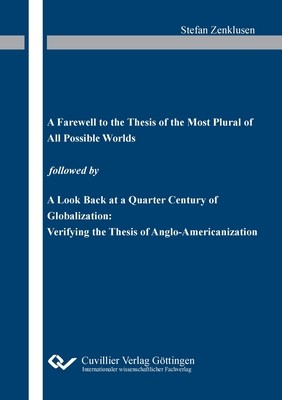
- We will send in 10–14 business days.
- Author: Stefan Zenklusen
- Publisher: Cuvillier
- ISBN-10: 3736972733
- ISBN-13: 9783736972735
- Format: 14.8 x 21 x 0.5 cm, softcover
- Language: English
- SAVE -10% with code: EXTRA
"A Farewell to the Thesis of the Most Plural of All Possible Worlds followed by "A Look Back at a Quarter Century of Globalization (e-book) (used book) | bookbook.eu
Reviews
Description
The first essay in this volume consists of a critical analysis of the findings of "pluralism" and "individualism" that have shaped scholarly opinion since the 1990s. Drawing on prototypical examples taken from the theoretical stock, it will be shown how brittle certain general theses are. The author demonstrates that the theses of pluralization and individualization are parts of an overarching and little-examined doxa, with a highly specific function of ideological and social pacification. The second text is, as it were, the empirical complement to the first. Here it is a question of falsifying the discourse-predominant above all in the German-speaking world-according to which cultural globalization (in the broadest sense) is "transnational," "hypercultural" (i.e. rootless), and represents an uncontrollable "métissage." In each instance, this journalistic and academic grand narrative denies that Americanization is taking place. On the basis of empirical facts, the author shows, in opposition to this, that despite the explosion of productive forces in the field of communications technology, globalization has a strong monocultural Anglo-Saxon bent. Both essays represent contributions to an epistemological rupture in globalization studies that has been overdue for almost 30 years, but that-in sociological and philosophical diagnoses of the times, and above all in neoconservative, German-speaking cultural studies-has been hindered by obstinate clinging to a myth.
EXTRA 10 % discount with code: EXTRA
The promotion ends in 20d.06:53:16
The discount code is valid when purchasing from 10 €. Discounts do not stack.
- Author: Stefan Zenklusen
- Publisher: Cuvillier
- ISBN-10: 3736972733
- ISBN-13: 9783736972735
- Format: 14.8 x 21 x 0.5 cm, softcover
- Language: English English
The first essay in this volume consists of a critical analysis of the findings of "pluralism" and "individualism" that have shaped scholarly opinion since the 1990s. Drawing on prototypical examples taken from the theoretical stock, it will be shown how brittle certain general theses are. The author demonstrates that the theses of pluralization and individualization are parts of an overarching and little-examined doxa, with a highly specific function of ideological and social pacification. The second text is, as it were, the empirical complement to the first. Here it is a question of falsifying the discourse-predominant above all in the German-speaking world-according to which cultural globalization (in the broadest sense) is "transnational," "hypercultural" (i.e. rootless), and represents an uncontrollable "métissage." In each instance, this journalistic and academic grand narrative denies that Americanization is taking place. On the basis of empirical facts, the author shows, in opposition to this, that despite the explosion of productive forces in the field of communications technology, globalization has a strong monocultural Anglo-Saxon bent. Both essays represent contributions to an epistemological rupture in globalization studies that has been overdue for almost 30 years, but that-in sociological and philosophical diagnoses of the times, and above all in neoconservative, German-speaking cultural studies-has been hindered by obstinate clinging to a myth.


Reviews